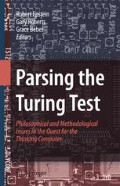Abstract
I claim that to pass the Turing Test over any period of extended time, it will be necessary to embed the entity into society. This chapter discusses why this is, and how it might be brought about. I start by arguing that intelligence is better characterized by tests of social interaction, especially in open-ended and extended situations. I then argue that learning is an essential component of intelligence and hence that a universal intelligence is impossible. These two arguments support the relevance of the Turing Test as a particular, but appropriate test of interactive intelligence. I look to the human case to argue that individual intelligence uses society to a considerable extent for its development. Taking a lead from the human case, I outline how a socially embedded Artificial Intelligence might be brought about in terms of four aspects: free will, emotion, empathy, and self-modeling. In each case, I try to specify what social ‘hooks’ might be required for the full ability to develop during a considerable period of in situ acculturation. The chapter ends by speculating what it might be like to live with the result.
Access this chapter
Tax calculation will be finalised at checkout
Purchases are for personal use only
Preview
Unable to display preview. Download preview PDF.
References
Aydede, M., 1999, Language of thought hypothesis: state of the art, in: Stanford Encyclopedia ofPhilosophy; http://plato.stanford.edu/entries/language-thought/.
Aydede, M. and Güzeldere, G., 2002, Consciousness, intentionality, and intelligence: some foundational issues for artificial intelligence; http://web.clas.ufl.edu/users/maydede/introspection.htm.
Baron-Cohen, S., Leslie, A.M., et al., 1985, Does the autistic child have a ‘theory of mind’? Cognition21: 37–46.
Baum, E., 1998, Manifesto for an Evolutionary Economics of Intelligence, in: B., NeuralNetworks and Machine Learning, Springer, pp. 285–344.
Bridgeman, B., 1992, On the evolution of consciousness and language, Pscoloquy3; http://www.cogsci.soton.ac.uk/cgi/psyc/newpsy?3.15.
Brooks, R. A., 1991, Intelligence without representation, Artificial Intelligence47(1–3): 139–159.
Burns, T. R. and Engdahl, E., 1998, The social construction of consciousness part 2: individual selves, self-awareness, and reflectivity, Journal of Consciousness Studies2: 166–184.
Byrne, R. W. and Whiten, A., 1988, Machiavellian Intelligence: Social Expertise and theEvolution of Intellect in Monkeys, Apes and Humans, Clarendon Press, Oxford University Press, Oxford.
Byrne, R. W. and Whiten, A., 1997, Machiavellian Intelligence II: Extensions and Evaluations, Cambridge University Press, Cambridge.
Dautenhahn, K., 1997, I could be you: the phenomenological dimension of social understanding, Cybernetics and Systems28: 417–453.
Dennett, D. C., 1984, Elbow Room: The Varieties of Free Will Worth Wanting, Oxford University Press, Oxford.
Dennett, D. C., 1989, The origin of selves, Cogito3(163–173).
Drescher, G. L., 1991, Made-up Minds – A Constructivist Approach to Artificial Intelligence, MIT Press, Cambridge, MA.
Edmonds, B., 1999a, Capturing social embeddedness: a constructivist approach, AdaptiveBehavior7(3–4): 323–347.
Edmonds, B., 1999b, Gossip, sexual recombination and the el farol bar: modelling the emergence of heterogeneity, Journal of Artificial Societies and Social Simulation2(3).
Edmonds, B., 2000, The constructability of artificial intelligence (as defined by the Turing Test), Journal of Logic Language and Information9: 419–424.
Edmonds, B., 2001 Meta-genetic programming: co-evolving the operators of variation, Elektrik9(1): 13–29.
Ernst, G. and Newell, A., 1969, GPS: A Case Study in Generality and Problem Solving, Academic Press, New York.
French, R. M., 1990, Subcognition and the limits of the Turing test, Mind99: 53–65.
Goldberg, D. E., Deb, K., et al., 1989, Messy genetic algorithms: motivation, analysis, and first results, Complex Systems3: 493–530.
Gopnik, A., 1993, How we know our minds: the illusion of first-person knowledge of intentionality, Behavioural and Brain Sciences16: 1–14.
Hendriks-Jansen, H., 1997, The epistomology of autism: making a case for an embodied, dynamic, and historic explanation, Cybernetics and Systems28: 359–416.
Hoffman, J., 1993, Vorhersage und Erkenntnis [Anticipation and Cognition], Hogrefe, Goettingen, Germany.
Hofstadter, D. R., 1985, Analogies and roles in human and machine thinking, in: MetamagicalThemas: Questing for the Essence of Mind and Pattern, Penguin, London.
Holland, J. H., 1992, Adaptation in Natural and Artificial Systems, MIT Press, Cambridge, MA.
Jannink, J., 1994, Cracking and co-evolving randomlist, in: Advances in Genetic Programming, K. E. Kinnear, ed., MIT Press, Cambridge, MA.
Koza, J. R., 1992, Genetic Programming: On the Programming of Computers by Means of NaturalSelection, MIT Press, Cambridge, MA.
Koza, J. R., 1994, Genetic Programming II: Automatic Discovery of Reusable Subprograms, MIT Press, Cambridge, MA.
Kummer, H., Daston, L., Gigerenzer, G., and Silk, J., 1997, The social intelligence hypothesis, in: Human by Nature: Between Biology and the Social Sciences, Weingart et al., eds., Lawrence Erlbaum, Hillsdale, NJ, pp. 157–179.
Minsky, M., 2002, The emotion machine; http://web.media.mit.edu/˜minsky/
Perlis, D., 1997, Consciousness as self-function, Journal of Consciousness Studies4: 509–525.
Rolls, E. T., 2000, Precis of the brain and emotion, Behavioural and Brain Sciences23(2): 177–191.
Sloman, A., 2002, How many separately evolved emotional beasties live within us?, in: P. S.Emotions in Humans and Artifacts, MIT Press, Cambridge, MA.
Stolzmann, W., 1998, Anticipatory Classifier Systems, Genetic Programming, University of Wisconsin, Morgan Kaufmann, Madison, WI, pp. 658–664.
Tolman, E. C., 1932, Purposive Behavior in Animals and Men, Appleton, New York.
Weizenbaum, J., 1976, Computer Power and Human Reason: From Judgement to Calculation, W. H. Freeman, San Francisco, CA
Wolpert, D. H. and Macready, W. G., 1995, No free lunch theorems for search, Santa Fe Institute Technical Report SFI-TR-95–02–010.
Author information
Authors and Affiliations
Editor information
Editors and Affiliations
Rights and permissions
Copyright information
© 2009 Springer Science+Business Media B.V.
About this chapter
Cite this chapter
Edmonds, B. (2009). The Social Embedding of Intelligence. In: Epstein, R., Roberts, G., Beber, G. (eds) Parsing the Turing Test. Springer, Dordrecht. https://doi.org/10.1007/978-1-4020-6710-5_14
Download citation
DOI: https://doi.org/10.1007/978-1-4020-6710-5_14
Published:
Publisher Name: Springer, Dordrecht
Print ISBN: 978-1-4020-9624-2
Online ISBN: 978-1-4020-6710-5
eBook Packages: Computer ScienceComputer Science (R0)

